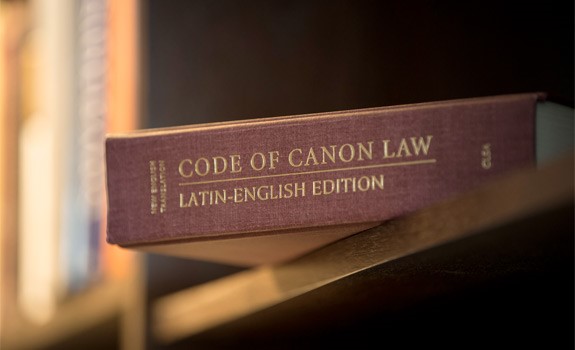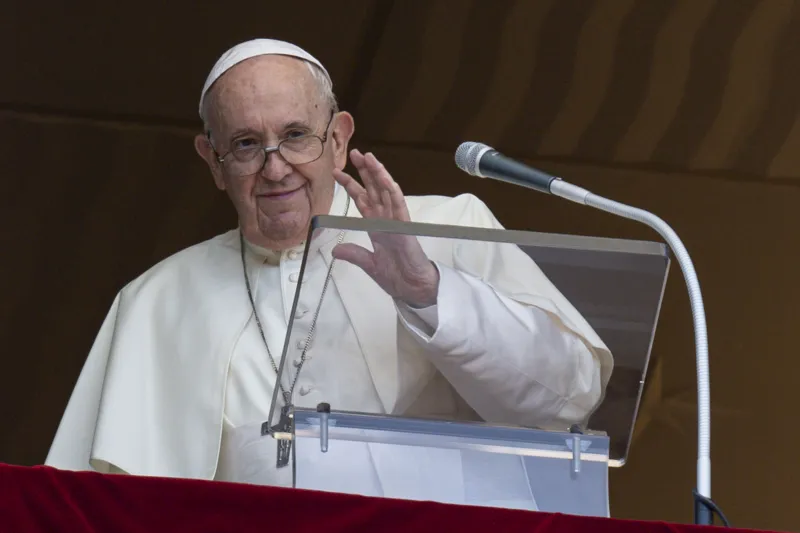
I applaud Massimo Faggioli’s recognition that “canon law is clearly an important part of the Catholic tradition” and join him in urging that “the curricula of Catholic theologians should include more” canon law. His own Commonweal essay on what he thinks are the canonical implications of the appearance of Pope Francis’ letter to the Argentine bishops in the Acta Apostolicae Sedis illustrates several of the ways that non-canonists can stumble over canonical issues while setting those faulty views before the public. Let me just comment on some of Faggioli’s assertions.
1. Faggioli: “Changes in canon law don’t come quickly, as the ongoing reception of Amoris Laetitia since its promulgation in April 2016 is currently reminding us.” Well, sure, especially when papal documents do not change, or even mention, the canonical norms at issue. It is not easy to change a canon by not talking about it.
2. Faggioli: “The news this week that Pope Francis has officially recognized the interpretation of Chapter VIII of the exhortation put forth by Argentine bishops indicates that change does nevertheless occur.” But this is old news; Francis “recognized” the Argentine document when he signed his name to a letter endorsing their document last year. The appearance of Francis’ letter in the Acta Apostolicae Sedis adds nothing to his act of last year.
3. The Argentine document “includes guidelines noting that there is no such thing as ‘unrestricted access to the sacraments,’ but that in some situations a process of discernment ‘opens the possibility’ to receipt of communion for divorced and remarried Catholics.” No one, I mean no one, ever seriously thought that a right to “unrestricted access to the sacraments” existed, and the constantly repeated, reassuring claims that such a danger has been firmly ruled out are vacuous.
4. Notwithstanding Faggioli’s exaggerated read of its significance, Francis’ placing the label “magisterial” on his letter to the Argentines (rather as he dubbed his recent remarks on the liturgical renewal movement as “magisterial”) is indeed unusual. I can think of several unquestionably magisterial statements being made by, say, Benedict XVI or St. John Paul II, but off hand, I do not recall either of them everlabeling their statements as “magisterial”. Papal statements, assessed in the light of criteria that Church law and tradition apply in such cases, either qualify as magisterial (a term whose import, by the way, is routinely exaggerated in common parlance) or they don’t so qualify. Labels attached do not, in my opinion, modify the nature of the assertion, but they do contribute to the mistaken view that papal “magisterium” is something that can be lightly turned on and off.
5. Of course, much of Faggioli’s (and others’) excited thinking aboutAmoris, the Argentine’s document, and the pope’s endorsement of it, assumes that Francis et al. have repudiated—to make a long story short—Canon 915 and the unbroken, divinely rooted, traditionbehind it. To be sure, one could read Amoris and its progeny as doing exactly that, for the words in Amoris support that interpretation. But they also support exactly the opposite interpretation, namely, they can be read so that divorced-and-remarried Catholics are, as they have unquestionably always been, included among those regarded by Canon 915 as obstinately persevering in manifest grave sin (as each of those terms has been understood over the centuries, understandings that might not coincide exactly with how non-canonists might understand them) and thus are (outside of one well-defined situation) ineligible to present themselves for holy Communion thereby occasioning in ministers of that most august Sacrament the duty to withhold the Eucharist if such persons do present themselves. The plausibility of diametrically opposed interpretations of the text of Amoris is precisely why, in my view, theDubia posed by four cardinals warrant a direct, clear, and authoritative response.
6. Faggioli’s invocation of the famous 1875 letter of Bl Pius IX to the German bishops endorsing their view of papal primacy against extra-ecclesial attacks, as if it were remotely comparable to Francis’ endorsement of the Argentine document, beggars belief.
I invite interested persons to examine an English translation of the German bishops’ statement, Pius’ response letter, and his later consistorial remarks on it, as found in Donald Logan, “The 1875 statement of the German bishops on episcopal powers”, The Jurist 21 (1961) 285-295, and ask themselves whether the detail, clarity, and precision used by the German bishops in describing the matters before them are in any way comparable to the “endlessly malleable considerations phrased in verbiage redolent of the 1970s” employed, as I have said, by the Argentines in addressing their topic. I note that Pius’ endorsement of the German document, undoubtedly sufficient to make their language his, was not, to my knowledge, ever labeled “magisterial” by that pope. It didn’t need to be so labeled, for magisterial statements speak magisterially according to their own nature.
7. Faggioli’s comments on “desuetude” (a canonical mechanism for letting obsolete laws fall from force) are far too superficial for him to be able to appeal to desuetude as a pretext to disregard the undoubted meaning of Canon 915. But to his comment that, from his “personal experience, the focus on canon 915 in the U.S. Catholic Church is an exception”, I would say two things: first, God bless the USA for still having enough well formed and committed Catholics to be aware that Canon 915 exists and that it is being disregarded by many to their spiritual detriment; second, my personal experience indicates that Canon 915 is not being discussed in some regions of the world because Catholics in those places have no doubt but that Canon 915 applies to, among others, divorced-and-remarried Catholics. No one debates what everyone acknowledges.
8. Faggioli writes: “The real issue is that there is and will be probably a situation in which the issue of allowing, in some circumstances, remarried divorcees to receive communion will receive different treatments in different parts of the world—even perhaps depending on the particular country, or diocese, or area of the diocese.” Seriously? And this is a good thing, that, say, divorced-and-remarried Catholics in, I dunno, the Downriver Vicariate of the AOD are prohibited holy Communion while those in the Monroe Vicariate are permitted to receive? Does this make even the slightest pastoral or doctrinal sense?
Even to suggest such a situation—one wherein, as George Weigel put it, what is “a grave sin in Poland is a source of grace two kilometers across the border in Germany”—as being in any way acceptable suggests a lack of understanding of many things besides just canon law. Still, a better understanding of canon law might help forestall such bizarre scenarios before they gain traction.
And so end as I began, by recommending with Faggioli that theologians receive more education in canon law, at least before venturing too many opinions on it.
(This post originally appeared on the In the Light of the Law site and appears here by kind permission of Dr. Peters.)
If you value the news and views Catholic World Report provides, please consider donating to support our efforts. Your contribution will help us continue to make CWR available to all readers worldwide for free, without a subscription. Thank you for your generosity!
Click here for more information on donating to CWR. Click here to sign up for our newsletter.







Mr Bean strikes out. But do Commonweal readers care? Probably not.
The good news is that, at least the last time I checked, the total number of Commonweal subscribers was less than 5000.
And that includes institutional subscribers (as in libraries)
Canon lawyer Edward Peters and Dr. John Joy, co-Founder and President of the St. Albert the Great Center for Scholastic Studies and a specialist in Magisterial authority are in apparent agreement as I read thru this article. Dr Joy said “It means that it is an official act of the pope rather than an act of the pope as a private person. But this doesn’t necessarily mean that the letter to the Argentine bishops requires religious submission of will and intellect which would only apply if the document intended to teach on matters of faith and morals”–posted by 1P5] The letter of affirmation now introduced in Acta Apostolica doesn’t as both commentators agree and I agree teach anything. It’s an affirmation of another letter from Argentina regarding request for approbation of the Argentine directives. There is no specification of what is approved in the Pope’s letter. Cardinal Coccopalmiero very recently announced that the Argentine letter seeking Pontifical approbation is now also included in Acta Apostolica. Coccopalmiero sought to publicly reassure that this act now raises the opinions of the Argentine Bishops regarding possible exceptions for communion to D&R as official and similarly raises Ch 8 AL to the level of promulgated [words to that effect] Doctrine. The snag in this remain similar to the arguments contra by Peters and Joy. And it’s someone other than the Pontiff, their author that makes this claim. Furthermore what the Pontiff said in AL and whatever he meant in his letter does not comply with Prop Two of the Doctrinal Commentary to Ad Tuendam Fidem requiring sententia definitive intenda for it to be binding. My take is that the Pontiff himself must definitively state his intention [sententia definitive intenda] for it rise above skulduggery.
An addendum to my comment is the important condition regarding Proposition Two of the Doctrinal Commentary, which Proposition Two addresses the Authentic Magisterium when it directly references the Deposit of the Faith [Proposition One], unlike doctrine on a lower level of import in Proposition Three for example disciplinary matters. Any expression of the Authentic Magisterium made by the Pontiff referencing the Deposit must therefore be by formal pronouncement or sentantia definitive intenda. The two letters in the Acta are not valid magisterial doctrine as purported by Cardinal Coccopalmiero and implied by Cardinal Parolin.
This critique also applies to an article by robert fastiggi now in la stampa, which makes some of the same errors. He and Faggioli essentially start and end in the same place, though for different reasons. The sad fact is that both really know better or else are lacking basic competence as theologians, which would also not be a surprise in this day and age.